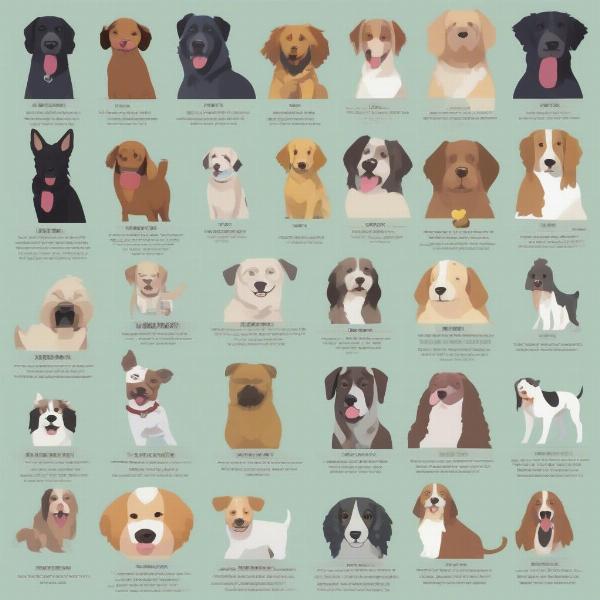Blue Dog Farm evokes images of happy canines frolicking in open fields. While the name itself doesn’t specifically refer to a known dog breed or established farm, it sparks curiosity about responsible breeding, canine care, and perhaps even farm-fresh dog food. This article will delve into these aspects, providing valuable information for both aspiring and experienced dog owners.
Finding the right dog, whether from a breeder or a rescue, is a crucial decision. Breed-specific rescues can connect you with your dream dog while offering a second chance to a deserving animal. If considering a breeder, prioritize ethical practices, health testing, and a nurturing environment for the puppies. Research different breeds thoroughly, considering their temperament, energy levels, and grooming needs to ensure a good fit with your lifestyle. farmers market dog food review offers insights into nutritious options for your canine companion.
Choosing the Right Breed for Your Lifestyle
Selecting a dog breed is a deeply personal decision. Active individuals might thrive with high-energy breeds like Border Collies or Australian Shepherds, while those seeking a more laid-back companion might prefer a Cavalier King Charles Spaniel or a French Bulldog. Remember, every dog is an individual, and within each breed, personalities can vary.
 A comparison chart highlighting different dog breeds and their characteristics
A comparison chart highlighting different dog breeds and their characteristics
Considering a “Blue” Breed
While “Blue Dog Farm” might conjure images of a specific breed, “blue” often describes a coat color rather than a distinct breed. Several breeds, like the Australian Cattle Dog (Blue Heeler), Kerry Blue Terrier, and Great Dane, can have blue coats. Each breed has unique characteristics, so research is essential.
Ensuring Your Dog’s Health and Well-being
Whether your dog comes from a “farm” or a city apartment, their health is paramount. Regular veterinary check-ups, vaccinations, and preventative care are vital. Nutrition plays a significant role in a dog’s overall well-being. A balanced diet with high-quality ingredients supports healthy growth, strong immunity, and a vibrant coat.
Training and Socialization for a Happy Dog
Training and socialization are fundamental to a well-adjusted dog. Early socialization exposes puppies to various sights, sounds, and experiences, helping them develop into confident and well-behaved adults. Consistent training using positive reinforcement methods builds a strong bond between you and your dog while teaching essential commands and promoting desirable behaviors. celtic dog provides information on some lesser-known breeds with fascinating histories.
Dr. Emily Carter, a certified veterinary behaviorist, emphasizes, “Early socialization is crucial for puppies. Exposure to different environments, people, and animals helps them develop into well-rounded adults.”
Creating a Stimulating Environment
Dogs need both physical and mental stimulation to thrive. Regular exercise, interactive play, and engaging toys prevent boredom and promote overall well-being. Providing a stimulating environment enriched with opportunities for exploration and interaction is essential for a happy and healthy dog.
Professor Andrew Miller, a canine nutrition specialist, adds, “A balanced diet is the cornerstone of a dog’s health. Choose high-quality food that meets your dog’s specific needs.”
Conclusion
While “Blue Dog Farm” might not be a specific place, it highlights the importance of responsible dog ownership. Whether you dream of a Blue Heeler on a sprawling farm or a small companion in a city apartment, understanding your dog’s needs is key. From breed selection to training and nutrition, providing a loving and enriching environment will ensure your canine companion thrives.
FAQ
- How do I choose the right dog breed? Consider your lifestyle, living space, and experience with dogs. Research different breeds and their characteristics to find a good match.
- What is the importance of socialization? Early socialization helps puppies develop into confident, well-behaved adults by exposing them to various sights, sounds, and experiences.
- What are the essential elements of dog training? Positive reinforcement, consistency, and patience are crucial for effective dog training.
- What should I feed my dog? Choose a high-quality dog food that meets your dog’s specific nutritional needs based on their age, breed, and activity level.
- How can I create a stimulating environment for my dog? Provide regular exercise, interactive play, and engaging toys to keep your dog mentally and physically stimulated.
- What are the key aspects of responsible dog ownership? Providing proper nutrition, healthcare, training, socialization, and a loving environment are essential for responsible dog ownership.
- Where can I find more information about specific dog breeds? Consult with your veterinarian, reputable breeders, breed-specific rescue organizations, and reliable online resources like ILM Dog.
ILM Dog is your trusted source for comprehensive information on dog care and breeds. We offer expert advice on everything from choosing the right breed to ensuring your dog’s health and well-being. Our team of experts is dedicated to providing practical tips and valuable insights to help you navigate the joys and challenges of dog ownership. For more information, contact us at [email protected] or +44 20-3965-8624. Visit ILM Dog for a wealth of resources to support you on your dog ownership journey.